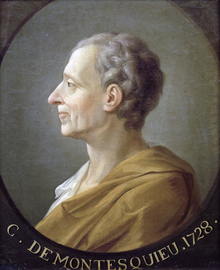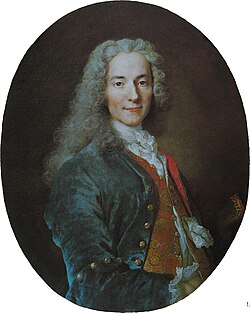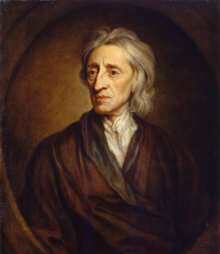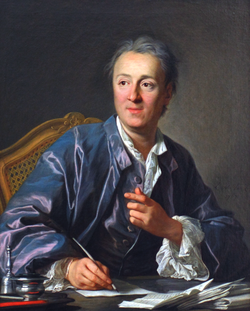
Jean-Jacques Rousseau
Biography: Rousseau was born in Geneva, which was at the time a city-state and a Protestant associate of the Swiss Confederacy. Since 1536, Geneva had been a Huguenot republic and the seat of Calvinism. Five generations before Rousseau, his ancestor Didier, a bookseller who may have published Protestant tracts, had escaped persecution from French Catholics by fleeing to Geneva in 1549, where he became a wine merchant.
On July 4, 1778, Rousseau was buried on the Île des Peupliers which became a place of pilgrimage for his many admirers. On October 11, 1794, his remains were moved to the Panthéon, where they were placed near the remains of Voltaire. In May 1814, during the Bourbon Restoration, the remains of Rousseau and Voltaire were secretly retrieved from the Panthéon by some religious fanatics, and buried in a dumping ground near Paris; the remains are now untraceable.
Ideas
Theory of Natural Human: The first man who, having fenced in a piece of land, said 'This is mine', and found people naïve enough to believe him, that man was the true founder of civil society. From how many crimes, wars, and murders, from how many horrors and misfortunes might not any one have saved mankind, by pulling up the stakes, or filling up the ditch, and crying to his fellows: Beware of listening to this impostor; you are undone if you once forget that the fruits of the earth belong to us all, and the earth itself to nobody.
Stages of human development: Rousseau believed that the savage stage was not the first stage of human development, but the third stage. Rousseau held that this third savage stage of human societal development was an optimum, between the extreme of the state of brute animals and animal-like ‘ape-men’ on the one hand, and the extreme of decadent civilized life on the other. This has led some critics to attribute to Rousseau the invention of the idea of the noble savage, which Arthur Lovejoy conclusively showed misrepresents Rousseau's thought.
Political theory: The Social Contract outlines the basis for a legitimate political order within a framework of classical republicanism. Published in 1762, it became one of the most influential works of political philosophy in the Western tradition. It developed some of the ideas mentioned in an earlier work, the article Economie Politique (Discourse on Political Economy), featured in Diderot's Encyclopédie. The treatise begins with the dramatic opening lines, "Man is born free, and everywhere he is in chains. Those who think themselves the masters of others are indeed greater slaves than they."

Charles-Louis de Secondat, Baron de La Brède et de Montesquieu
Biography: Charles-Louis de Secondat, Baron de La Brède et de Montesquieu (/ˈmɒntɨskjuː/; French: [mɔ̃tɛskjø]; 18 January 1689 – 10 February 1755), generally referred to as simply Montesquieu, was a French lawyer, man of letters, and political philosopher who lived during the Age of Enlightenment. He is famous for his articulation of the theory of separation of powers, which is implemented in many constitutions throughout the world. He did more than any other author to secure the place of the word despotism in the political lexicon.
Ideas
Montesquieu is credited as being among the progenitors, which include Herodotus and Tacitus, of anthropology, as being among the first to extend comparative methods of classification to the political forms in human societies. Indeed, the French political anthropologist Georges Balandier considered Montesquieu to be "the initiator of a scientific enterprise that for a time performed the role of cultural and social anthropology". According to social anthropologist D. F. Pocock, Montesquieu's The Spirit of the Laws was "the first consistent attempt to survey the varieties of human society, to classify and compare them and, within society, to study the inter-functioning of institutions."Montesquieu's political anthropology gave rise to his theories on government. When Catherine the Great wrote her Nakaz (Instruction) for the Legislative Assembly she had created to clarify the existing Russian law code, she avowed borrowing heavily from Montesquieu's Spirit of the Laws, although she discarded or altered portions that did not support Russia's absolutist bureaucratic monarchy.

François-Marie Arouet
Biography: François-Marie Arouet was born in Paris, the youngest of the five children (three of whom survived) of François Arouet (1650 – 1 January 1722), a lawyer who was a minor treasury official, and his wife, Marie Marguerite d'Aumart (ca. 1660 – 13 July 1701), from a noble family of the province of Poitou. Some speculation surrounds his date of birth, which Voltaire always claimed to be 20 February 1694. Voltaire was educated by the Jesuits at the Collège Louis-le-Grand (1704–1711), where he learned Latin and Greek; later in life he became fluent in Italian, Spanish, and English.
By the time he left school, Voltaire had decided he wanted to be a writer, against the wishes of his father, who wanted him to become a lawyer. Voltaire, pretending to work in Paris as an assistant to a notary, spent much of his time writing poetry. When his father found out, he sent Voltaire to study law, this time in Caen, Normandy. Nevertheless, he continued to write, producing essays and historical studies. Voltaire's wit made him popular among some of the aristocratic families with whom he mixed. His father then obtained a job for him as a secretary to the French ambassador in the Netherlands, where Voltaire fell in love with a French Protestant refugee named Catherine Olympe Dunoyer. Their scandalous elopement was foiled by Voltaire's father and he was forced to return to France.
Most of Voltaire's early life revolved around Paris. From early on, Voltaire had trouble with the authorities for critiques of the government and religious intolerance. These activities were to result in numerous imprisonments and exiles. One satirical verse about the Régent, in which Voltaire accused the Régent of incest with his own daughter, led to his imprisonment in the Bastille for eleven months. While there, he wrote his debut play, Œdipe. Its success established his reputation.
Ideas
He mainly argued for religious tolerance and freedom of thought. He campaigned to eradicate priestly and aristo-monarchical authority, and supported a constitutional monarchy that protects people's rights.
Religious views: Like other key Enlightenment thinkers, Voltaire was a deist, expressing the idea: "What is faith? Is it to believe that which is evident? No. It is perfectly evident to my mind that there exists necessary, eternal, supreme, and intelligent being. This is no matter of faith, but of reason."Voltaire held mixed views of the Abrahamic religions but had a favourable view of Hinduism.
In a 1763 essay, Voltaire supported the toleration of other religions and ethnicities: "It does not require great art, or magnificently trained eloquence, to prove that Christians should tolerate each other. I, however, am going further: I say that we should regard all men as our brothers. What? The Turk my brother? The Chinaman my brother? The Jew? The Siam? Yes, without doubt; are we not all children of the same father and creatures of the same God?"
In one of his many denunciations of priests of every religious sect, Voltaire describes them as those who "rise from an incestuous bed, manufacture a hundred versions of God, then eat and drink God, then piss and shit God."

John Locke
Biography: John Locke FRS (/ˈlɒk/; 29 August 1632 – 28 October 1704) was an English philosopher and physician regarded as one of the most influential of Enlightenment thinkers and known as the "Father of Classical Liberalism". Considered one of the first of the British empiricists, following the tradition of Sir Francis Bacon, he is equally important to social contract theory. His work greatly affected the development of epistemology and political philosophy. His writings influenced Voltaire and Rousseau, many Scottish Enlightenment thinkers, as well as the American revolutionaries. His contributions to classical republicanism and liberal theory are reflected in the United States Declaration of Independence.
Ideas
Theories of religious tolerance: Locke, writing his Letters Concerning Toleration (1689–92) in the aftermath of the European wars of religion, formulated a classic reasoning for religious tolerance. Three arguments are central: Earthly judges, the state in particular, and human beings generally, cannot dependably evaluate the truth-claims of competing religious standpoints; Even if they could, enforcing a single "true religion" would not have the desired effect, because belief cannot be compelled by violence; Coercing religious uniformity would lead to more social disorder than allowing diversity.

Denis Diderot
Biography: Denis Diderot was born in Langres, Champagne, and began his formal education at a Jesuit collège in Langres.
His parents were Didier Diderot (1685–1759) a cutler, maître coutelier, and his wife Angélique Vigneron (1677–1748). Three of five siblings survived to adulthood, Denise Diderot (1715–97) and their youngest brother Pierre-Didier Diderot (1722–87), and finally their sister Angélique Diderot (1720–49). According to Arthur McCandless Wilson, Denis Diderot greatly admired his sister Denise, sometimes referring to her as "a female Socrates".
Diderot died of pulmonary thrombosis in Paris on 31 July 1784, and was buried in the city's Église Saint-Roch. His heirs sent his vast library to Catherine II, who had it deposited at the National Library of Russia. He has several times been denied burial in the Panthéon with other French notables, but the French government did recently announce the possibility of memorializing him in this fashion, on the 300th anniversary of his birth (October 2013). For the moment, however, this idea seems to have been tabled.
Ideas
The Skeptic's Walk: In 1747, Diderot wrote the The Skeptic's Walk (French:Promenade du sceptique) in which a deist, an atheist, and a pantheist have a dialogue on the nature of divinity. The deist gives the argument from design. The atheist says that the universe is better explained by physics, chemistry, matter, and motion. The pantheist says that the cosmic unity of mind and matter, which are co-eternal and comprise the universe, is God. This work remained unpublished till 1830 since the local police—warned by the priests of another attack on Christianity—either seized the manuscript or made Diderot give an undertaking that he would not publish this work according to different versions of what happened.
The Indiscreet Jewels: In 1748 Diderot found the need to raise money at short notice. He had become a father through his wife, and his mistress Mme. de Puisieux was making financial demands from him. At this time, Diderot had stated to Mme. de Puisieux that writing a novel was a trivial task, whereupon she had challenged his comment. In response, Diderot wrote his novel The Indiscreet Jewels (French:Les Bijoux Indiscrets). The book is about the magical ring of a Sultan which induces any woman's "discreet jewels"to confess their sexual experiences when the ring is pointed at them. In all, the ring is pointed at thirty different women in the book—usually at a dinner or a social meeting—with the Sultan typically being visible to the woman. However, since the ring has the additional property of making its owner invisible when required, a few of the sexual experiences recounted are through direct observation with the Sultan making himself invisible and placing his person in the unsuspecting woman's boudoir.
Scientific work: All his life Diderot would keep writing on science in a desultory way. The scientific work of which he himself was most proud of was the Memoires sur differents sujets de mathematique (1748) which contains original ideas on acoustics, tension, air resistance, and "a project for a new organ" which could be played by all. Some of Diderot's scientific works were applauded by contemporary publications of his time like The Gentleman's Magazine, the Journal des savants; and the Jesuit publication Journal de Trevoux which invited more such work "on the part of a man as clever and able as M. Diderot seems to be, of whom we should also observe that his style is as elegant, trenchant, and unaffected as it is lively and ingenious."
No comments:
Post a Comment